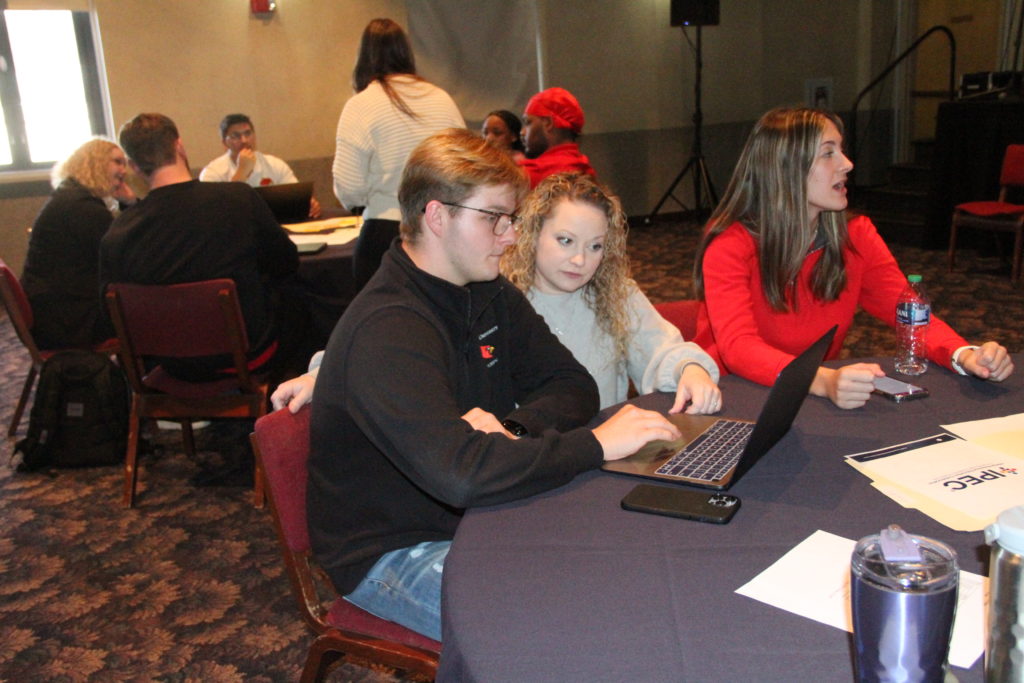March 12, 2024
Wheeling’s IPE Teaches Health Science Students To Treat Whole Person
WHEELING, W.Va., March 12 – Communication among health care professionals is key to providing patients quality care. Recently, Wheeling University students spent a day learning how effective communication can impact the development of a collaborative patient treatment plan.
This marks the eighth year, that students in the Physical Therapy, Nursing, Athletic Training and Exercise Science programs teamed up to collaboratively work through the management of a multidisciplinary patient paper case during the annual University’s Interprofessional Education Event (IPE).
“What makes our IPE event unique is that we also focus on the Ignatian principle of cura personalis – or care for the whole person. Our IPE day includes the University Chaplain and the Director of the Counseling Center, because caring for a patient involves treating more than their injury or illness. These two individuals help the students learn that providing pastoral and psychological care is a key part of the patient’s treatment, ” said Dr. Krissy Grubler, clinical associate professor of Physical Therapy and coordinator of the IPE event.
More than 60 students divided into nine teams with each group collaborating to discuss the management of the paper case for best patient care. The focus of the discussion is on interprofessional communication and collaboration. . The groups worked through the patient management of a student-athlete in a paper case for a 20-year-old female collegiate soccer player who sustained an on-field injury to her right knee and also sustained a concussion. Additionally, the soccer player, who has a history of asthma, could not put any weight on the injured leg and complained of a headache and dizziness. Another aspect of the paper case was the IPE teams had to address that Spanish was the player’s first language and her parents, who were at the game, do not speak Spanish.
Jill Emery, director of Nursing programs at the University, noted, “Interprofessional education helps students understand the importance of collaboration to enhance patient care. Students learn the role of each discipline which helps to promote effective teamwork and communication as they enter the workforce.”
To help the IPE teams understand the roles and responsibilities of each discipline as they work through the paper case , the students could call upon members of the Wheeling University health science faculty, as well as a diverse panel of local clinicians for assistance. The local clinicians included an athletic trainer, EMT, a certified exercise physiologist, a physician assistant, a respiratory therapist, a counselor, a physical therapist, a family nurse practitioner and a pharmacist.
Dr. Grubler said having community health care professionals on hand for this day of learning is important because “they understand interprofessional collaboration – they live it and experience it in their professional lives. What they bring to our students is real-world experience.”
In addition to Grubler and Emery, faculty on hand for the IPE day included: Dr. Missy Bozovich, director of Athletic Training and Exercise Science, Dr. Kathy Blatt, assistant professor of Exercise Science, Dr. Rhonda Haley, assistant professor and director of Clinical Education for Physical Therapy, Nathan Harshberger, instructor of Exercise Science, Sarah Pettit, instructor of Athletic Training; and Dr. Bryan Raudenbush, professor of Physical Therapy (Neuroscience & Research).
The local panel of experts were: Anthony McDaniel an EMT; Meghann Kolb, DPT, local physical therapist; Caitlin Garman, an athletic trainer; Tina Tordella, director of Counseling Services at Wheeling University; Shauna Parsons, a certified family nurse practitioner; Matt Rafa, a pharmacist; Dr. Lance Tarr a certified exercise physiologist; and Ryan Rafa, a physician assistant and respiratory therapist.

